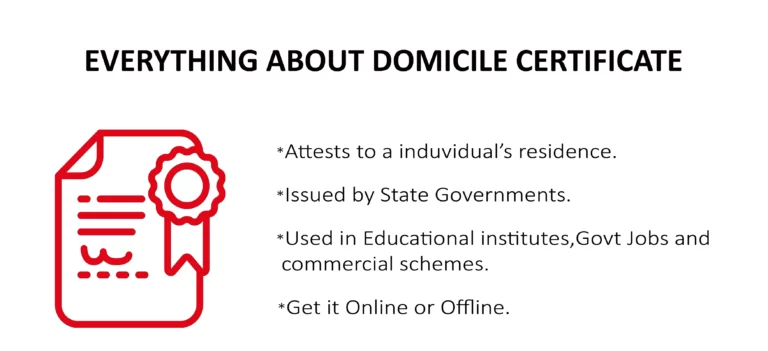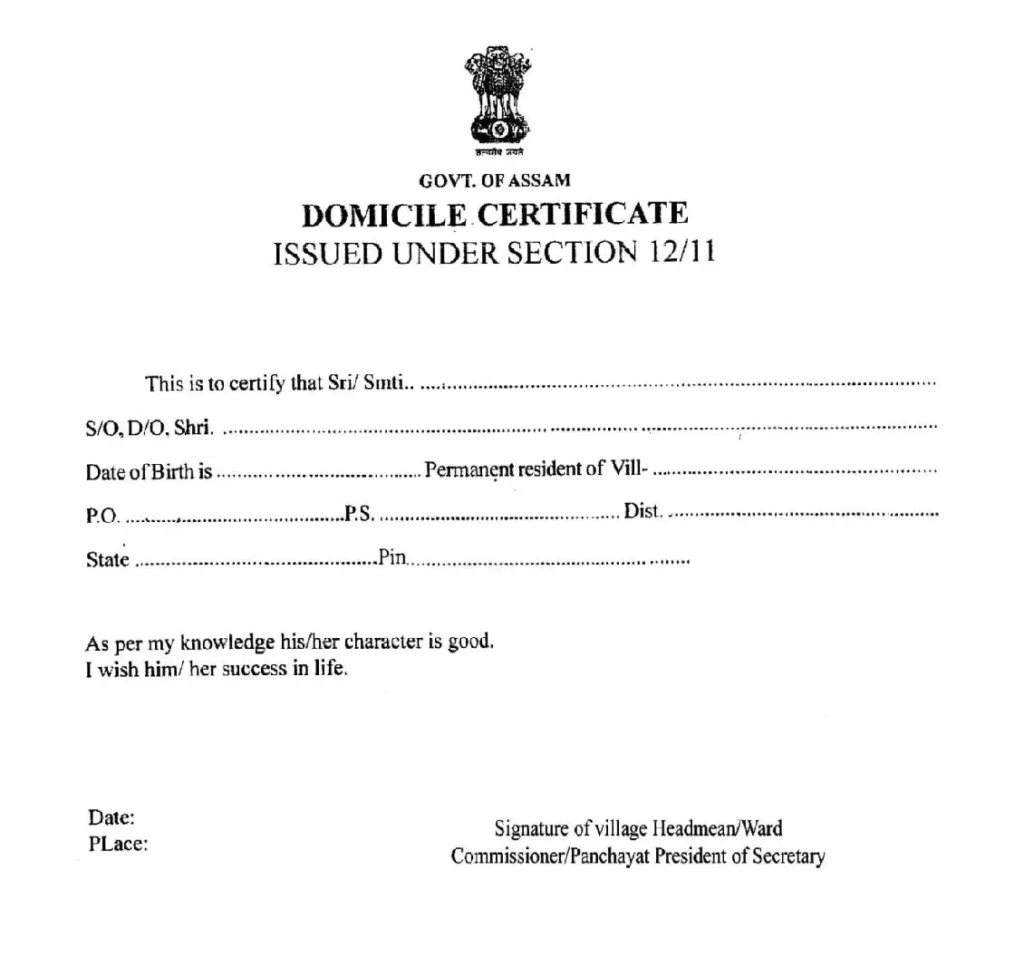
What is domicile Certificate? What does a domicile certificate mean?
A domicile certificate is a document that verifies the residential status of an individual in a particular state or union territory in India. This certificate is issued by the local government authorities and is used as proof of one’s place of residence. The term ‘domicile’ refers to the place where a person resides and has his or her permanent home.
What are the Uses or benefits of Domicile Certificate?
The concept of domicile is of utmost importance in the legal system of India. It is used to determine an individual’s eligibility for various benefits, such as;
- Admission to educational institutions
- Government schemes.
A domicile certificate is also used as proof of residency for various legal and administrative purposes, such as;
- Obtaining a passport
- Driving license, or PAN card.
Apart from these administrative purposes, a domicile certificate is also essential for availing various government schemes and benefits. For instance, many state governments provide scholarships and other benefits to students belonging to the state.
To avail of these benefits, the student needs to provide a domicile certificate as proof of his or her residency. Similarly, various government schemes such as housing and healthcare are also available to individuals who have a domicile certificate.
How to Apply for a Domicile Certificate?
The process of obtaining a domicile certificate in India is governed by the respective state or union territory’s rules and regulations. Generally, the application for a domicile certificate can be made online or in-person at the local tehsil or revenue office.
The applicant needs to provide certain documents to prove his or her residency, such as;
- Voter ID card, electricity bill, water bill, or rent agreement.
The applicant also needs to provide a declaration stating that he or she has been living in the state or union territory for a certain period, usually six months to one year.
What are the types of Domicile Certificates?
In India, there are primarily two types of domicile certificates: temporary and permanent. Let’s take a closer look at each type:
- Temporary Domicile Certificate: A temporary domicile certificate is issued to individuals who have been residing in a state or union territory for a short period, usually less than six months.
This type of certificate is commonly used by students, migrant workers, or individuals who have recently relocated to a new state or union territory for work or study purposes. The temporary domicile certificate is valid for a limited period, and individuals need to renew it once it expires.
This certificate is mainly used for availing certain benefits or services in the short term.
- 2. Permanent Domicile Certificate: A permanent domicile certificate is issued to individuals who have been residing in a state or union territory for a more extended period, usually more than six months to a year.
This type of certificate is commonly used by individuals who have permanently settled in a state or union territory, such as individuals born and raised in a particular state, or those who have lived there for many years. The permanent domicile certificate is valid for a more extended period and does not need to be renewed frequently.
This certificate is mainly used for availing long-term benefits or services, such as government schemes or employment opportunities.
Apart from these two main types, some states or union territories may issue specific types of domicile certificates, such as a domicile certificate for women, which is used for providing certain benefits or reservations to women residing in the state or union territory. It is essential to check with the local authorities regarding the specific type of domicile certificate required for a particular purpose.
How to apply for a domicile certificate?
As we told the Meaning of Domicile CertificateThe process of applying for a domicile certificate may vary from state to state in India. However, here is a general step-by-step guide on how to apply for a domicile certificate:
- Obtain the application form: The first step is to obtain the application form for the domicile certificate. The application form can be obtained from the local tehsil or revenue office or can be downloaded from the official website of the state government.
- Fill in the application form: Fill in the application form with accurate details such as name, date of birth, gender, father’s name, and address.
- Attach the required documents: Attach the necessary documents as prescribed by the state government. These may include proof of address, identity proof, and any other documents that may be required by the state government.
- Submit the application form: Submit the application form along with the required documents at the local tehsil or revenue office.
- Pay the application fee: Pay the application fee as prescribed by the state government. The fee may vary from state to state.
- Verification and processing: After submitting the application form, the local authorities will verify the documents and conduct an inquiry if required. Once the verification is complete, the domicile certificate will be issued to the applicant within a specific period, as per the state government’s rules and regulations.
Who can apply for a domicile Certificate?
- Residency: The applicant must have been a resident of the state or union territory for a specific period, as prescribed by the state government. The period may vary from state to state, but it is usually between six months to one year.
- Birth or Parental Origin: The applicant should either be born in the state or union territory, or their parents should have been born in the state or union territory.
- Property Ownership: The applicant should own a property or land in the state or union territory.
- Education: The applicant should have completed their education in the state or union territory.
- Employment: The applicant should be employed in the state or union territory.
- Marriage: The applicant should be married to a resident of the state or union territory.
- Other circumstances: There may be other specific circumstances, such as being a refugee, that may make an individual eligible for a domicile certificate in some states.
It is essential to check with the local authorities regarding the specific eligibility criteria for a domicile certificate in a particular state or union territory. The documentation required to prove eligibility may also vary from state to state, and it is important to have the necessary documents before applying for the certificate.
Domicile certificate meaning in Hindi
“Domicile certificate” in Hindi is called “निवास प्रमाण-पत्र” (Nivās Pramāṇ-Patra).
निवास प्रमाण-पत्र, जिसे हिंदी में ‘डोमिसाइल सर्टिफिकेट’ कहा जाता है, एक महत्वपूर्ण दस्तावेज है जो किसी व्यक्ति के स्थायी निवास स्थान की पुष्टि करता है। यह प्रमाण-पत्र एक व्यक्ति के निवासी राज्य या क्षेत्र को स्थायी रूप से सत्यापित करने के लिए प्रदान किया जाता है। निवास प्रमाण-पत्र में व्यक्ति के नाम, पिता का नाम, जन्म तिथि, पता, और मूल निवास के बारे में जानकारी शामिल होती है। यह दस्तावेज सरकारी और निजी उद्योगों, शैक्षणिक संस्थानों, रोजगार के लिए आवेदन, स्कालरशिप, सरकारी योजनाओं के लाभ आदि के लिए आवश्यक होता है। यह दस्तावेज व्यक्ति के मूल निवास को सत्यापित करने के साथ-साथ उसे संबंधित राज्य या क्षेत्र की नागरिकता और आरक्षणीय अधिकारों का लाभ देने में मदद करता है।
Domicile certificate meaning in Telugu
In Telugu, the term “domicile certificate” can be translated as “స్థాయి నివాస సర్టిఫికేట్” (sthayi nivaasa sartifikēṭ). The domicile certificate is an official document issued by the state government that confirms an individual’s residential status in a particular state or union territory of India. It serves as proof that the person has been residing in that state or union territory for a specific period, making them eligible for various state-specific benefits and privileges.
Why choose us for Bonafide translation services?
Abayam is a highly certified Bonafide translation company in Chennai and firmly believes that high-quality translations cannot be achieved with machine translations. It, therefore, works with only highly qualified and experienced translators, thereby enhancing productivity and efficiency.
Being one of the prominent Bonafide Translation Services providers, Abayam employs translators, editors, writers, and proofreaders who are native speakers of the language and are well qualified to choose appropriate translators for every project.
Abayam believes in quality assurance with its team of expert translators, complete support and service to the clients, affordability, certified translations, and customer satisfaction

100
Human Translation
100
Native Translators
100
Quality Assurance

Request a Quote Now
What People Say About Us
The Quality of the output and the prompt delivery on the said date are their special quality. Their follow up work after the translation in case of any changes are examples of extra mile they provide
K V Rajan
L&D Director Coca-Cola Bottling Company of Bahrain & Qatar
We are pleased with the services of Abayam Translation Services The quality of work is extremely good and we definitely look forward to working with Abayam for all our multi lingual translation services
Ganesh Kumar
Madhura Micro Finance













